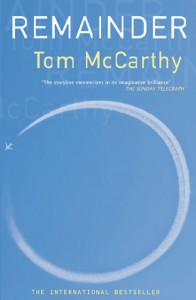 Because Zadie Smith told me to, I followed up my reading of Netherland with Tom McCarthy’s Remainder. Here’s a passage from a paragraph late in the latter novel. The protagonist (or Enactor, in Smith’s reading) is musing on hearing in an actual performance what one of his employees has spoken to him numerous times in rehearsals:
Because Zadie Smith told me to, I followed up my reading of Netherland with Tom McCarthy’s Remainder. Here’s a passage from a paragraph late in the latter novel. The protagonist (or Enactor, in Smith’s reading) is musing on hearing in an actual performance what one of his employees has spoken to him numerous times in rehearsals:
I’d listened to him speak those same words countless times already, in rehearsals. I’d scripted them myself; I’d told him to say exactly those ones, to repeat the word “arriving” and replace “it’s” with “the van’s” in the second half, although the “it” already was the van. I’d heard them over and over, spoken in exactly the same tone, at the same speed, volume and pitch—but now the words were different. During our rehearsals, they’d been accurate—accurate in that we’d had the replica van turn up and park in the replica road as the re-enactor practised [sic] speaking them. Now, though they were more than accurate: they were true.
It’s a progression or hierarchy I probably subscribe to.
Happily. Readily.
I’m also, on the side, reading this, which is swiftly becoming my favorite nonfiction craft text ever written. Stewart edited the front page of the Wall Street Journal in the 1980s, so expect conservatism and an overall siding with the journalists in any nonfiction-and-fact argument, but get a load of this!
I classify myself more as a “fact” person rather than an “ideology” person. I find, generally, that the world’s population can be divided along these lines, which run very deep in the human character. Fact people want to know where the truth lies before forming an opinion or judgment [sic]. Ideology people, conversely, tend to hold strong opinions and judgments [sic] and seek facts to confirm them. Fact people tend to be far less predictable, since their views derive from ever-changing facts, and less judgmental [sic], since they are accustomed to waiting before forming opinions. They tend to be more open to new experiences, more comfortable with change and uncertainty, and more willing to embrace contradiction and complexity. They are often, by nature, agnostic. Many scientists are fact people.
Ideology people tend to reason from a fixed set of principles; they prefer order and certainty, are capable of ignoring or rationalizing conflicting information, are comfortable with the notion of faith, and are willing to believe in something before it can be proven. While each category of people no doubt believe [sic] their [sic] view of the universe is better for mankind as a whole, they take [sic?] a dim, and sometimes surprisingly hostile, view of the other. I have heard some ideology people denounce fact people as weak, amoral, and lacking backbone. Fact people, in turn, can be equally intolerant of what they perceive as stupidity, blindness, hypocrisy, and a primitive need for myth on the part of ideology people. Most of us, of course, display aspects of both personalities, depending on the circumstances.
Oh paragraphs, where you were during D’Agatagate 2012? I would have owned every argument.
Kids: let’s always remember that “Art for art’s sake” is such an ideology (one I hope never to subscribe to). And also: the truth is more than accurate. Again: Most of us, of course, display aspects of both personalities, depending on the circumstances. But no one in CNF Nation is going to allow this to possibly be true, so let’s all get it tattoo’d on our eyelids.